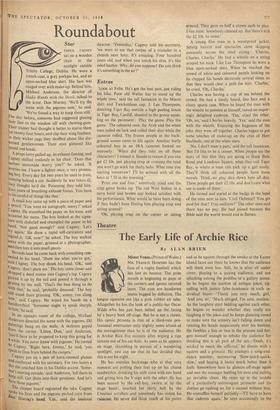Roundabout
Star
JAMES CAGNEY
A props lorry pulled up, its exhaust fuming, and C agney shifted restlessly in his chair. 'Does that tarbon monoxide worry you?' he asked. 'It Worries me. I knew a fighter once, a very promis- ing boy. Every day for two years he used to train, running behind a car. Suddenly he was taken ill; they thought he'd die. Poisoning they told him. two Years of breathing exhaust fumes. You have to be careful of things like that.'
A small boy came up with a piece of paper and a Pencil. 'You want an autograph, sonny?' asked CagneY. He smoothed the paper on his knee, and scrawled his name. The boy looked at the signa- ture with disbelief and crumpled the paper in his hand. 'Not good enough?' said Cagney. 'Let's try again,' He drew a rapid self-caricature and signed ,it. 'OK now?' he asked. The boy walked away with the paper, grinned at a photographer, and then tore it into small pieces. Seconds later he came back with something con- cealed in his hand. 'Show me what you've got,' said Cagney. The boy shook his head. `OK,' said (jagneY, 'don't show me.' The boy came closer and dropped a dead mouse into Cagney's lap. Cagney Picked it up by the tail and posted it through a grating by the wall. 'That's the best thing to do With that,' he said, 'probably diseased.' The boy still stood there grinning. 'OK, sonny, run along now,' said Cagney. He wiped his hands on a handkerchief. 'Someone ought to speak sharply t° him,' he said.
In an upstairs room of the college, Michael Anderson directed the scene with the pigeons. Oil Paintings hung on the walls. A skeleton gaped from the corner. 'Listen, Don,' said Anderson, You'll have to be prepared to keep this going for a while. You never know with pigeons.' He turned Cagney. 'Right here, Jimmy,' he said, 'you speak to Don from behind the camera.' Cagney put on a pair of horn-rimmed glasses and conferred with his secretary. For two hours a daY she coached him in his Dublin accent. 'Some- °tle's moving outside,' said Anderson, 'tell them to keep still. Get them into their positions. And let's have those pigeons.' The clapper board registered the take. Cagney spoke his lines and the pigeons pecked corn from 1:
°4 Murray's hand. 'Cut,' said the assistant director. 'Yesterday,' Cagney told his secretary, 'we went to see that corpse of a crusader in a church near here. It's amazing. Four hundred years old, and when you touch his skin, it's like oiled leather. Why, do you suppose? Do you think it's something in the air?'
Extras
'LOOK AT Felix. He's got the best part, just riding his bike. Poor old Walter has to stand up the whole time,' said the tall Jamaican in the Miami shirt and Twickenham cap. J. Lee Thompson, directing Tiger Bay outside a high peeling house in Tiger Bay, Cardiff, shouted to the group squat- ting on the pavement : 'Play the game. Play the game.' The coloured men, the Arab and the white man called on luck and rolled their dice while the cameras rolled. The frozen people in the back- ground scenes came to life again. Another burly coloured boy in an IRA raincoat looked on morosely : 'When did they take on all these characters? I missed it. Stands to reason if you can get £2 10s. just playing crap or crossing the road you won't go work for thirty bobs. What time you starting tomorrow? I'll be around with all the boys at 7.30 in the morning.'
'Print one and four,' somebody cried and the crap game broke up. The old West Indian in a navy beret and brown suit looked satisfied with his performance. What would he have been doing if they hadn't been filming him playing crap and sitting around?
'Oh, playing crap on the corner or sitting around. They gave us half a crown each to play. I lost mine. Somebody cleaned up. But there's still the £2 10s. to come.'
A young film man in a waterproof jacket, Seberg haircut and spectacles came skipping anxiously across the road crying : 'Charles, Charles, Charles.' He had a whistle on a string around his neck. Like Lee Thompson he wore a blue open-necked shirt. When he reached the crowd of white and coloured people looking on he clapped his hands decisively several times so that they would clear a path for him. 'Charles,' he cried, 'Oh, Charles.'
Charles was having a cup of tea behind the crowd. He had a lovely beard, fine face and a classy sports coat. When he heard the man with the whistle he pointed at himself, raised an inquir- ingly delighted eyebrow. 'Yes,' cried the other. 'Oh, no,' said Charles heavily. 'Yes,' said the man with the whistle. Enjoying the hugeness of the joke, they went off together. Charles began to put sons touches of make-up on the chin of Hort Buchholz, one of the white stars.
'No. I don't want a part,' said the tall Jamaican. 'But I'd like to be a censor. When people see the story of this film they are going to think Bute Road and Loudoun Square, what they call Tiger Bay, is where a man can pick up a girl easily. They'll think all coloured people have loose morals. Think,we play dice down here all day. These people get their £2 10s. and don't care what use is made of them.'
He turned and stared at the badge in the lapel of the man next to him. 'Civil Defence? You get paid for that? Free uniform?' The other man said there was no pay. He had joined because the Bible said the world would end in flames.


































 Previous page
Previous page